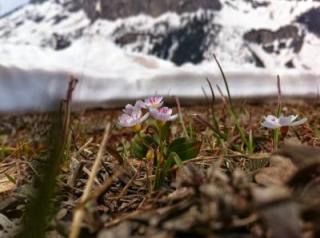Feb 8 2016
Climate change may harm early-flowering plants not through plant-pollinator mismatch but through frost damage, a Dartmouth College-led study shows.
 Studying the western spring beauty wildflower, Dartmouth College's Zak Gezon and his colleagues found that climate change may harm early-flowering plants not through plant-pollinator mismatch but through frost damage. Credit: Zak Gezon
Studying the western spring beauty wildflower, Dartmouth College's Zak Gezon and his colleagues found that climate change may harm early-flowering plants not through plant-pollinator mismatch but through frost damage. Credit: Zak Gezon
The findings appear in the journal Global Change Biology. A PDF is available on request.
Climate change has many ecological effects, such as altering flowering phenology, or the blooming time of wildflowers, across the world. Altering blooming time often affects plant reproduction and survival, but the mechanisms behind these changes are not well understood.
The researchers used two large-scale field experiments to assess how altering the phenology of the western spring beauty affects plant-pollinator interactions and plant reproduction. The iconic white and pink mountain wildflower is visited primarily by native bees collecting nectar and/or pollen. The researchers found that altering blooming time caused low plant reproduction, but the cause of the reduction depended on the direction that the blooming time was altered. Contrary to their predictions, advanced blooming time did not reduce pollinator visits but caused low plant reproduction due to frost damage. Low reproduction due to disrupted plant-pollinator interactions was only achieved by delaying blooming time. Thus, plants face trade-offs with advanced flowering time: while early-flowering plants can reap the benefits of enhanced pollination, they do so at the cost of increased susceptibility to frost damage that can overwhelm any benefit of flowering early. In contrast, delayed flowering results in dramatic reductions in plant reproduction through reduced pollination.
"As phenology is advancing around the globe, there are concerns that plant-pollinator interactions may be disrupted through phenological mismatches, or mismatches in the timing of when flowers bloom and their pollinators emerge, leading to reduced plant reproduction," says lead author Zak Gezon, who conducted the research as a doctoral student at Dartmouth and who is now a conservation biologist with Disney's Animal Programs. "Our results suggest, however, that climate change may constrain reproduction of early-flowering plants mostly through the direct impacts of extreme environmental conditions rather than disrupted plant-pollinator interactions."